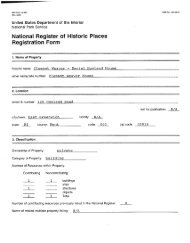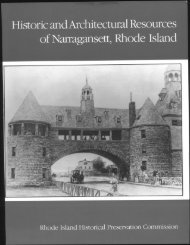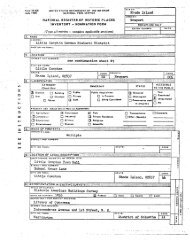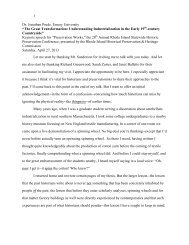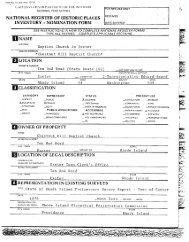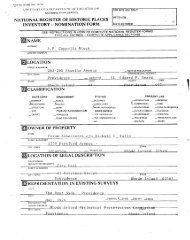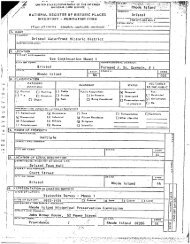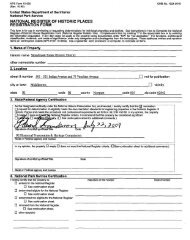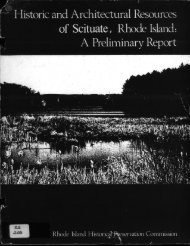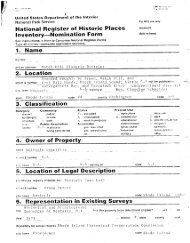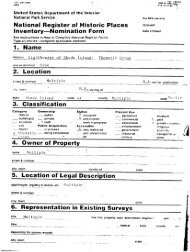National Park Service - Rhode Island Historical Preservation ...
National Park Service - Rhode Island Historical Preservation ...
National Park Service - Rhode Island Historical Preservation ...
Create successful ePaper yourself
Turn your PDF publications into a flip-book with our unique Google optimized e-Paper software.
- .0MB Nt 1024-0018<br />
NPS rorm 10-900-i - En,- 10-31-U<br />
3-82 -<br />
United States Department of the Interior -<br />
<strong>National</strong> <strong>Park</strong> <strong>Service</strong><br />
<strong>National</strong> Register of Historic Places<br />
Inventory-Nomination Form -<br />
Continuation sheet 47<br />
-<br />
t*4 a:-*- -* -<br />
‘t 45<br />
- Item number Page .<br />
Thus began Peace Dale. It remained very small. In the<br />
early 1820s there were only 30 inhabitants here, the wood-frame<br />
mill buildings,- five dwellings and a store. The mills had been<br />
taken- on by Rowland Hazard’s sons, Isaac P. and Rowland G.<br />
Hazard. By the end of the decade they had the-operation fully<br />
mechanized, producing coarse kersey cloth End linsey woolsey.<br />
Little new development occurred until the Hazard mills burned in<br />
the mid 1840s. The brothers decided to begin anew. They rebuilt<br />
their hydropower system to increase production capacity and in<br />
1847 completed a fireproof stone factory with distinctive stepped<br />
gable and double-monitor roof. They incorporated the Peace Dale<br />
Manufacturing Company in 1848 and in 1849 started to produce<br />
woolen shawls in place of the cheap yard goods of former days.<br />
Peace Dale shawls gained a considerable reputation and from this<br />
period on, the company specialized in high-quality products.<br />
Isaac P. Hazard served as company president until 1864. He<br />
took an-interest in politics and repeatedly represented South<br />
Kingstown in the state General Assembly. Rowland G. Hazard not<br />
only helped operate the family textile business, he assumed a<br />
role in local and national affairs, and pursued broader moral and<br />
philosophical topics. He wrote extensively. His "Essay on<br />
Language" 1834 was highly regarded. While travelling in<br />
England he met and befriended John Stuart Mill. He was staunchly<br />
opposed to slavery, helped found the Republican Party in<br />
furtherance of abolition, and -in 1860 participated in the party<br />
convention which nominated Lincoln. During the Civil War, though<br />
a pacifist, he promoted the Union cause through published essays<br />
bolstering Northern financial credit abroad. On a local level,<br />
Rowland G. Hazard built village schools and the South Kingstown<br />
Town Hall. He underwrote a library society and later published<br />
an essay on "The Duty of Individuals to Support Science and<br />
Literature" 1885.<br />
Rowland G. Hazard’E sons, John N. and Rowland Hazard II, ran<br />
the Peace Dale Mills in the late nineteenth century. It was the<br />
latter who had the greatest impact on development of the village.<br />
As a junior member of the firm in 1856 he designed a new stone -<br />
weaving mill and a stone building across from the mills to house<br />
offices, a store, the post office, and a public hall. Over the<br />
next four decades, as amateur architect and/or client,- he saw to<br />
the building of over half the extant physical fabric of Peace<br />
Dale. -<br />
In 1872 the Hazards again pioneered as textile<br />
manufacturers. They converted and greatly enlarged their plant



